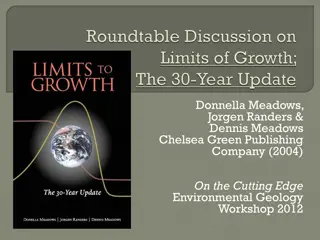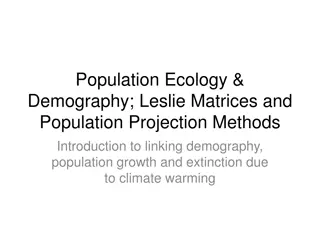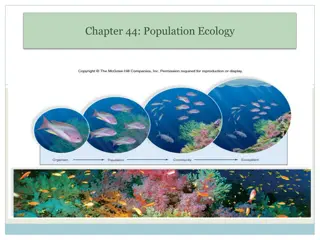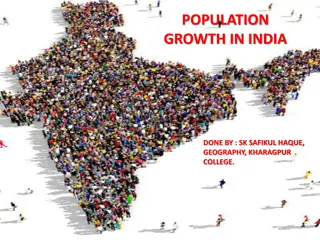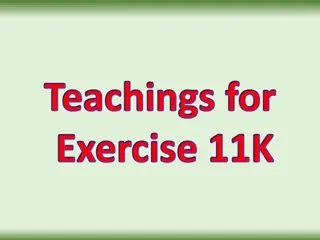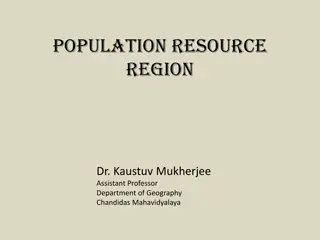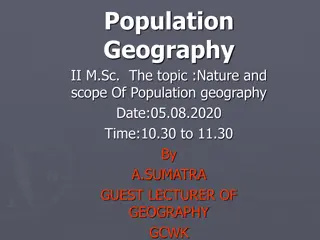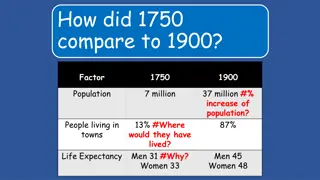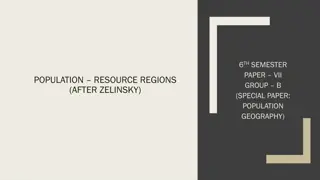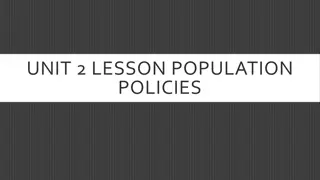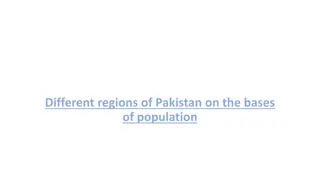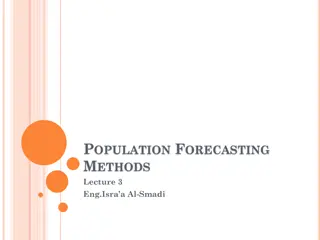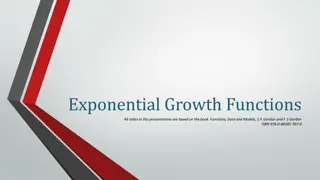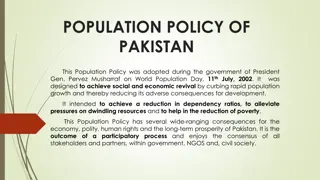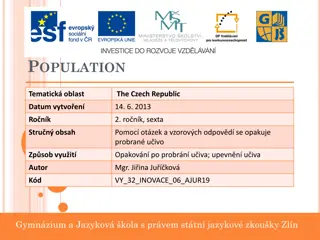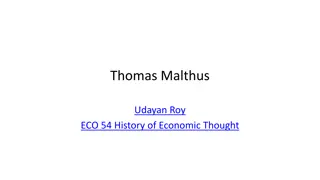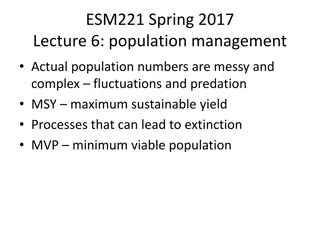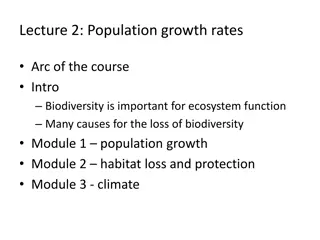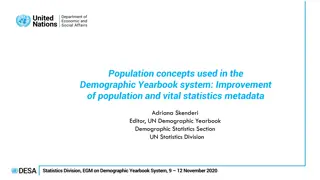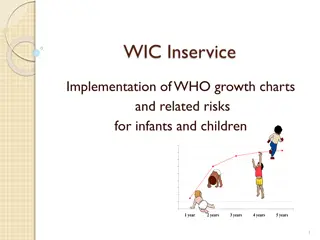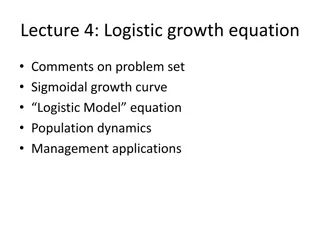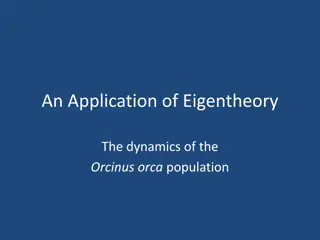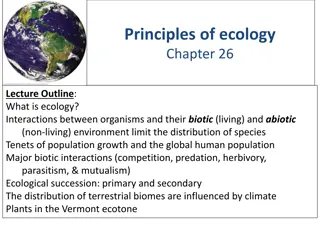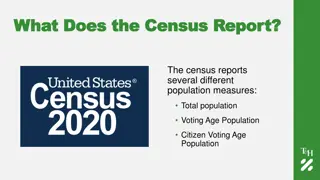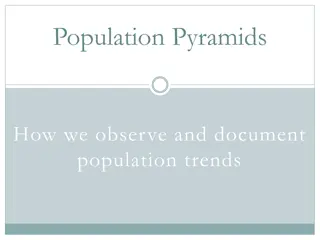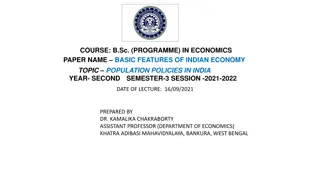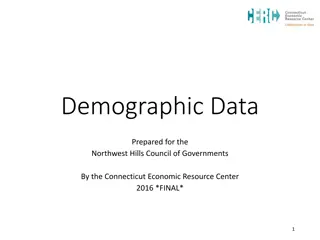Overview of the South African National Population Register
The South African National Population Register (NPR) is a vital system maintained by the Department of Home Affairs. It serves to record and update information on the country's resident population, issue identity documents, and handle related administrative tasks. The NPR has evolved over the years
2 views • 16 slides
Exploring Population Growth and Resource Limits Through 'Limits of Growth' Perspectives
This collection delves into the causes and solutions of population growth and resource limitations based on the insights from 'Limits to Growth' publications. The content covers topics such as overshoot, exponential growth, system dynamics, and strategies for transitioning to a sustainable system. I
0 views • 28 slides
Understanding Population Ecology and Demography Through Leslie Matrices
Explore the critical aspects of population ecology and demography, focusing on factors influencing abundance, population growth, regulation, and the impacts of climate change. Learn about population projections, growth models, age-structured populations, and data requirements for estimating populati
4 views • 35 slides
Understanding Population Ecology and Growth Patterns
Explore the intricacies of population ecology, demography, distribution patterns, and growth rates in natural populations. Learn about limiting factors, resources, biotic potential, and the concept of carrying capacity. Gain insights into population dynamics and the interplay between organisms and t
1 views • 19 slides
Factors Influencing Population Change in Chapter 24
This chapter explores key factors affecting population change including food supply, technology, healthcare, war, status of women, and education. It discusses how improved technology, healthcare advancements, and food availability impact population growth, as well as the demographic transition model
0 views • 40 slides
Impact of Human Population Growth on Environment and Welfare
The rapid growth of the human population is placing immense pressure on the environment, leading to increased demand for resources like food, water, and shelter. The effects of human activity on the environment have escalated significantly over the years due to population expansion. High birth rates
0 views • 8 slides
Population Growth in India: Challenges and Implications
Overpopulation is a pressing issue globally, with India being the 2nd most populous country. The rapid population growth is linked to challenges such as poverty and hindered development. Concepts like population explosion and demographic transition shed light on the dynamics. India's population grow
0 views • 36 slides
Thomas Malthus: Pioneer of Population Theory
Thomas Malthus, born in 1766, was a British scholar known for his essay on population growth. He predicted that unchecked population growth would lead to famine and poverty. His ideas are relevant to modern environmental issues, especially regarding overpopulation. Malthus advocated for regulating b
0 views • 5 slides
Exploring Evolution and Population Genetics in AP Biology
Delve into the fascinating world of evolution and population genetics with themes covering natural selection, genetic equilibrium, allele frequencies, and more. Understand how molecular and cellular events shape emergent properties at individual and population levels. Explore the impact of factors l
0 views • 12 slides
Understanding Integration for Modeling Population Growth
Learn how to apply differential equations for modeling population growth scenarios using integration. The provided content guides you through solving equations to determine population size, rates of increase, and timeframes, with practical examples and step-by-step explanations.
2 views • 14 slides
Introduction to Sampling in Statistics
Sampling in statistics involves selecting a subset of individuals from a population to gather information, as it is often impractical to study the entire population. This method helps in estimating population characteristics, although it comes with inherent sampling errors. Parameters represent popu
2 views • 24 slides
Understanding Population-Resource-Region Relationship: A Geographical Perspective
Explore the intricate relationship between population, resources, and regions through a geographical lens. Delve into classifications based on population, resources, and technology, with examples from different countries and regions. Discover the concepts of optimum population, over-population, and
1 views • 11 slides
Understanding Demography: Population Trends and Analysis
Demography is the study of population size, distribution, and composition, encompassing elements such as mortality, natality, migration, and demographic forces. Population census plays a crucial role in collecting and analyzing demographic data, with methods like De Jure and De Facto census. Inter-c
6 views • 21 slides
Understanding Population Geography: Nature and Scope
Population geography explores how spatial variations in population distribution, composition, migration, and growth are connected to geographic features. It focuses on the interplay between human societies, the physical environment, and cultural aspects. Factors influencing population distribution i
1 views • 13 slides
Comparing 1750 to 1900: Population Growth in Britain
The population of Britain saw a significant increase between 1750 and 1900. In 1750, the population was 7 million, and by 1900, it had grown to 37 million. This represented an 87% increase. The number of people living in towns also rose from 13% to a higher percentage. Factors contributing to this g
0 views • 6 slides
Population Resource Regions and Zelinsky's Classification
Geographers have long studied the relationship between population growth and resource adequacy, leading to the concept of Population Resource Regions (PRR) by W. Zelinsky. Zelinsky identified five types of PRR based on population-resource ratios, ranging from Type A with high resource utilization po
0 views • 8 slides
Understanding Population Policies and Their Impact on Growth Theories
Explore the various government policies - Expansive, Eugenic, and Restrictive - that influence population growth. Discover how these policies encourage or limit natural increase, such as promoting large families or imposing birth control measures. Learn about historical examples like China's one-chi
0 views • 17 slides
Population Distribution in Different Regions of Pakistan
The population distribution in Pakistan varies significantly among different regions, with certain provinces like Punjab and Sindh having higher population densities compared to Baluchistan and FATA. The rural areas are also categorized into different population density regions based on the number o
0 views • 14 slides
Methods of Population Forecasting for Urban Development
Designing water supply and sanitation schemes for cities requires accurate population forecasting. Factors influencing population changes include births, deaths, migration, and annexation. Various methods like Arithmetic Increase, Geometric Increase, and Ratio Method are used to predict population g
4 views • 24 slides
Understanding the Concept of Population and Unit Stock
The concept of population revolves around all organisms of the same species living in a specific area capable of interbreeding. It is essential to differentiate between sample populations and real populations to accurately study their attributes such as birth rates, death rates, and spatial dimensio
0 views • 15 slides
Understanding Exponential Growth Functions Based on Gordon's Book
This presentation delves into exponential growth functions using real-world examples such as the population growth of Niger. It covers topics such as algebra with exponents, finding formulas for growth models, terminology, and graphing population growth over time. The content explores how exponentia
1 views • 21 slides
Population Policy of Pakistan: Vision, Goals, and Strategies
The Population Policy of Pakistan, adopted in 2002, aims to stabilize the population by 2020 through a focus on reducing fertility rates and promoting family planning. The policy outlines goals such as achieving a balance between resources and population, increasing awareness of rapid population gro
0 views • 11 slides
Exploring Population Data of the Czech Republic
The data presents insights into the population of the Czech Republic, including demographics, language distribution, religious beliefs, literacy rates, life expectancy, and urban population percentages. The population pyramid reveals a dominance of people in the age group of 20-49, with longer life
0 views • 8 slides
Thomas Malthus and His Theory on Population Growth
Thomas Robert Malthus, an influential economist, proposed a theory on population growth in the 18th century. His theory suggested that population grows exponentially while food production increases at a slower rate, leading to inevitable food scarcity. Malthus also discussed the concept of preventiv
2 views • 19 slides
Population Management and Sustainable Harvesting Strategies
Actual population numbers exhibit complex fluctuations influenced by predation and other factors. Understanding concepts like Maximum Sustainable Yield (MSY) and Minimum Viable Population (MVP) can help in managing populations effectively. The concept of MSY ensures the maximum harvest of a renewabl
0 views • 32 slides
Understanding Population Dynamics and Biodiversity Loss
The content discusses the importance of biodiversity for ecosystem function, causes of biodiversity loss, factors affecting declining biodiversity, and strategies for managing populations and ecosystems to restore biodiversity. It covers topics such as population growth rates, habitat loss, climate
0 views • 39 slides
Louisiana Parish Population Statistics 2010
Louisiana Parish Population Statistics for the year 2010 reveal varying population numbers across different regions. The data provides insights into demographic changes and trends over the past decade. The total population change by parish and age group highlights shifts in different age brackets. T
0 views • 42 slides
Improvement of Population and Vital Statistics Metadata in the Demographic Yearbook System
The Demographic Yearbook system focuses on enhancing population and vital statistics metadata to ensure accurate and concise reflection of population concepts across 230+ countries. It involves annual collection of official national population estimates, vital statistics, and UN international travel
0 views • 16 slides
Implementation of WHO Growth Charts for Infants and Children
Growth charts are essential for assessing children's growth, with WHO setting international standards since 2006. The discussion includes interpreting growth charts, the history of growth references, and the difference between reference and standard growth. It compares CDC's U.S. growth reference to
0 views • 30 slides
Understanding Logistic Growth in Population Dynamics
Explore the logistic growth equation and its applications in modeling population dynamics. Dive into the concept of sigmoidal growth curves and the logistic model, which reflects population growth with limits. Learn how to calculate population change using the logistic growth equation and understand
0 views • 26 slides
Dynamics of Orcinus orca Population: An Application of Eigentheory
This study explores the dynamics of the Orcinus orca population using eigentheory models. It examines various age groups within the population and predicts their growth over a span of 100 years. Eigenvalues play a crucial role in understanding the evolution of the population dynamics.
0 views • 23 slides
Insights on 2019 Gender and Veteran Demographics
Analysis from the 2019 Annual Averages of the Current Population Survey reveals significant statistics regarding gender and veteran populations in the United States. Data indicates that veterans comprise 7.5% of the overall population, with women veterans totaling almost 2 million. Women veterans ma
0 views • 48 slides
Exploring Ecology: Interactions, Distribution, and Population Dynamics
Ecology delves into the relationships between organisms and their environment, understanding factors that limit species distribution, major interactions like competition and predation, as well as population growth patterns. This includes the influence of biotic and abiotic factors, ecological succes
0 views • 30 slides
Birth and Death Processes in Population Dynamics
Birth and death processes in population dynamics involve the concept of how organisms reproduce and die, leading to changes in population size over time. These processes can be generalized from the Poisson process and are crucial in queuing theory and modeling dynamic systems. The differential-diffe
0 views • 20 slides
Overview of Population Measures and District Data from Census Reports
The census reports various population measures including total population, voting age population, and citizen voting age population. The data includes breakdowns by ethnicity for each trustee district. Changes in voting and citizen voting age population percentages are also provided. Data is sourced
0 views • 4 slides
Understanding Population Pyramids for Analyzing Population Trends
Population pyramids are graphical illustrations that showcase the distribution of age groups within a population, segmented by gender. By observing and documenting the patterns of population pyramids, one can discern trends such as rapid growth, slow growth, or negative growth, which are influenced
0 views • 7 slides
Population Policies in India: Evolution and Impact
Population policies in India have evolved over the years, focusing on areas such as contraception, health care infrastructure, and integrated service delivery. The policies under different Five-Year Plans have emphasized various approaches, including natural family planning, sterilization techniques
0 views • 7 slides
Demographic Trends in Northwest Hills Council of Governments Region
The demographic data prepared for the Northwest Hills Council of Governments shows the historical population growth in the region from 1960 to 2010, comparing it to the state and national trends. The data highlights a 44% increase in the region's population, with specific towns experiencing signific
0 views • 33 slides
Maine Workforce and Population Trends Analysis 2014-2024
Maine's workforce and population outlook from 2014 to 2024 reveals a decline in births, resulting in an aging population and workforce imbalance. The state faces challenges due to low birth rates, negative natural population change, and minimal net migration, impacting labor force growth and total p
0 views • 31 slides
The Global Human Population Explosion: Causes and Implications
The lecture explores the rapid increase in the global human population post-World War II, analyzing factors such as birth rates, mortality rates, and life expectancy. Various counterarguments are presented, including the debate on population growth benefits, ethical concerns over reproductive interf
0 views • 20 slides

